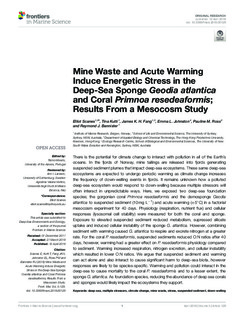| dc.contributor.author | Scanes, Elliot | |
| dc.contributor.author | Kutti, Tina | |
| dc.contributor.author | Fang, James Kar-Hei | |
| dc.contributor.author | Johnston, Emma L. | |
| dc.contributor.author | Ross, Pauline M | |
| dc.contributor.author | Bannister, Raymond | |
| dc.date.accessioned | 2018-11-09T11:17:32Z | |
| dc.date.available | 2018-11-09T11:17:32Z | |
| dc.date.created | 2018-09-06T12:26:56Z | |
| dc.date.issued | 2018 | |
| dc.identifier.issn | 2296-7745 | |
| dc.identifier.uri | http://hdl.handle.net/11250/2571778 | |
| dc.description.abstract | There is the potential for climate change to interact with pollution in all of the Earth's oceans. In the fjords of Norway, mine tailings are released into fjords generating suspended sediment plumes that impact deep-sea ecosystems. These same deep-sea ecosystems are expected to undergo periodic warming as climate change increases the frequency of down-welling events in fjords. It remains unknown how a polluted deep-sea ecosystem would respond to down-welling because multiple stressors will often interact in unpredictable ways. Here, we exposed two deep-sea foundation species; the gorgonian coral Primnoa resedaeformis and the demosponge Geodia atlantica to suspended sediment (10 mg L−1) and acute warming (+5°C) in a factorial mesocosm experiment for 40 days. Physiology (respiration, nutrient flux) and cellular responses (lysosomal cell stability) were measured for both the coral and sponge. Exposure to elevated suspended sediment reduced metabolism, supressed silicate uptake and induced cellular instability of the sponge G. atlantica. However, combining sediment with warming caused G. atlantica to respire and excrete nitrogen at a greater rate. For the coral P. resedaeformis, suspended sediments reduced O:N ratios after 40 days, however, warming had a greater effect on P. resedaeformis physiology compared to sediment. Warming increased respiration, nitrogen excretion, and cellular instability which resulted in lower O:N ratios. We argue that suspended sediment and warming can act alone and also interact to cause significant harm to deep-sea biota, however responses are likely to be species-specific. Warming and pollution could interact in the deep-sea to cause mortality to the coral P. resedaeformis and to a lesser extent, the sponge G. atlantica. As foundation species, reducing the abundance of deep sea corals and sponges would likely impact the ecosystems they support. | nb_NO |
| dc.language.iso | eng | nb_NO |
| dc.title | Mine waste and acute warming induce energetic stress in the deep-sea sponge Geodia atlantica and coral Primnoa resedeaformis; results from a mesocosm study | nb_NO |
| dc.title.alternative | Mine waste and acute warming induce energetic stress in the deep-sea sponge Geodia atlantica and coral Primnoa resedeaformis; results from a mesocosm study | nb_NO |
| dc.type | Journal article | nb_NO |
| dc.type | Peer reviewed | nb_NO |
| dc.description.version | publishedVersion | nb_NO |
| dc.source.volume | 5 | nb_NO |
| dc.source.journal | Frontiers in Marine Science | nb_NO |
| dc.identifier.doi | 10.3389/fmars.2018.00129 | |
| dc.identifier.cristin | 1607252 | |
| dc.relation.project | Norges forskningsråd: 225283 | nb_NO |
| dc.relation.project | Havforskningsinstituttet: 14515 | nb_NO |
| cristin.unitcode | 7431,12,0,0 | |
| cristin.unitname | Bentiske ressurser og prosesser | |
| cristin.ispublished | true | |
| cristin.fulltext | original | |
| cristin.qualitycode | 1 | |
